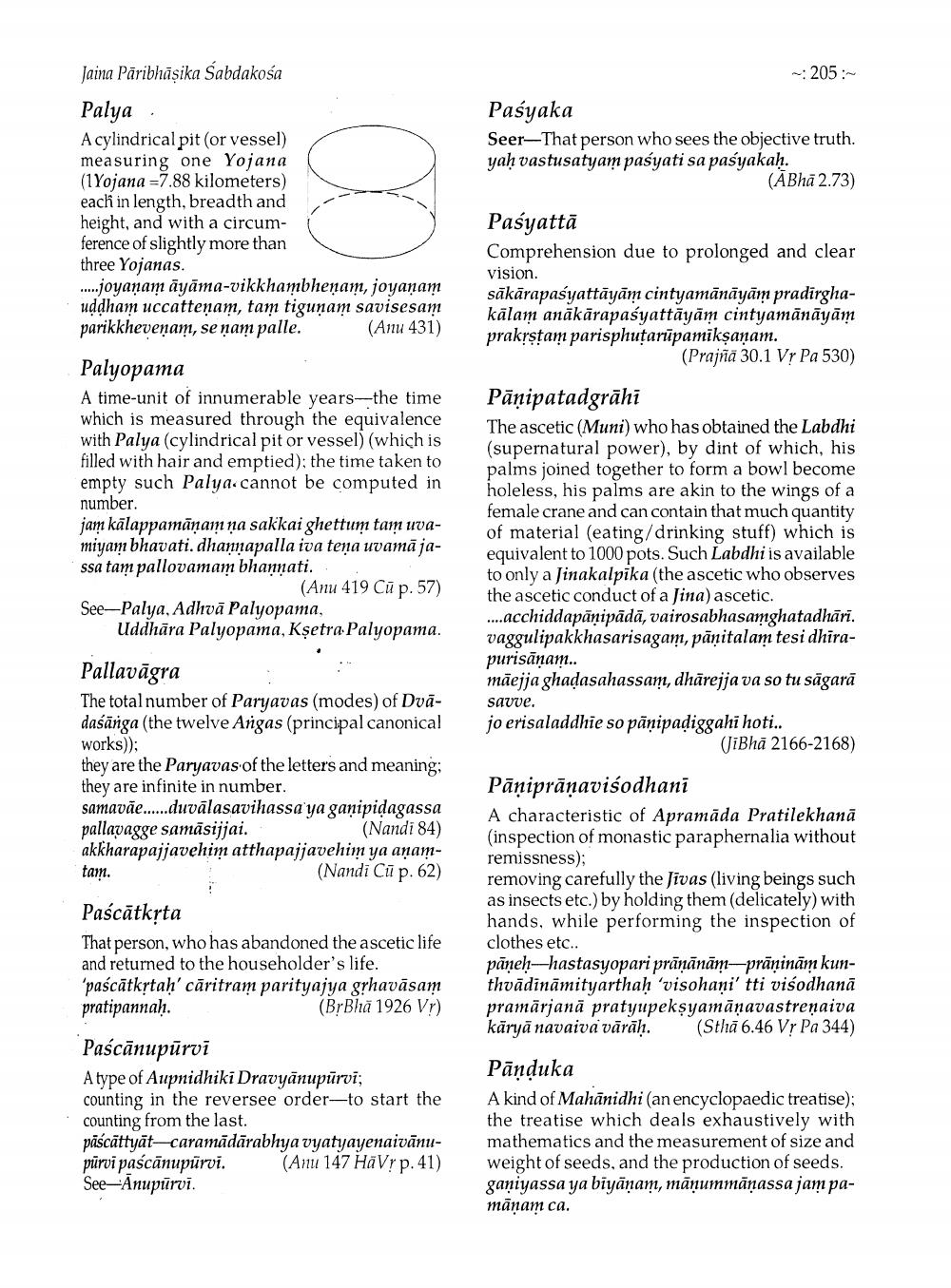________________
205 :
Paśyaka Seer-That person who sees the objective truth. yaḥ vastusatyam paśyati sa pasyakaḥ.
(ABhā 2.73)
Jaina Pāribhāșika Sabdakosa Palya A cylindrical pit (or vessel) measuring one Yojana (1Yojana =7.88 kilometers) each in length, breadth and height, and with a circumference of slightly more than three Yojanas. ...joyanam āyāma-vikkhambhenam, joyanam uddham uccattenam, tam tiguņam savisesam parikkheveņam, se nam palle. (Anu 431)
Pasyattā Comprehension due to prolonged and clear vision. sākārapaśyattāyām cintyamānāyām pradirghakālam anākārapaśyattāyām cintyamānāyām prakrstam parisphutarūpamiksanam.
(Prajna 30.1V Pa 530)
Palyopama A time-unit of innumerable years--the time which is measured through the equivalence with Palya (cylindrical pit or vessel) (which is filled with hair and emptied); the time taken to empty such Palya.cannot be computed in number. jam kālappamāṇamna sakkai ghettum tam uvamiyam bhavati. dhannapalla iva tena uvamājassa tam pallovamam bhannati.
(Anu 419 Cū p. 57) See-Palya, Adhvā Palyopama,
Uddhāra Palyopama, Kșetra Palyopama.
Pāṇipatadgrāhi The ascetic (Muni) who has obtained the Labdhi (supernatural power), by dint of which, his palms joined together to form a bowl become holeless, his palms are akin to the wings of a female crane and can contain that much quantity of material (eating/drinking stuff) which is equivalent to 1000 pots. Such Labdhi is available to only a Jinakalpika (the ascetic who observes the ascetic conduct of a Jina) ascetic. ....acchiddapānipādā, vairosabhasamghatadhāri. vaggulipakkhasarisagam, pāṇitalam tesi dhirapurisānam.. māejja ghadasahassam, dhārejja va so tu sägarā savve. jo erisaladdhie so pāņipadiggahi hoti..
(JiBhā 2166-2168)
Pallavāgra The total number of Paryavas (modes) of Dvādaśānga (the twelve Argas (principal canonical works)); they are the Paryavas of the letters and meaning; they are infinite in number. samavãe......duvālasavihassa'ya ganipidagassa pallavagge samāsijjai.
(Nandi 84) akkharapajjavehim atthapajjavehim ya anamtam.
(Nandi Cū p. 62)
Pascātkrta That person, who has abandoned the ascetic life and returned to the householder's life. pascātkrtah' cāritram parityajya grhavāsam pratipannaḥ.
(BrBhā 1926 VN)
Pāṇiprāņaviśodhani A characteristic of Apramāda Pratilekhanā (inspection of monastic paraphernalia without remissness); removing carefully the Jivas (living beings such as insects etc.) by holding them (delicately) with hands, while performing the inspection of clothes etc.. pāneh-hastasyopari prānānām-prāṇinām kunthvādināmityarthaḥ 'visohani' tti visodhanā pramārjanā pratyupeksyamānavastrenaiva kāryā navaiva vārāh. (Sthā 6.46 V? Pa 344)
Pascānupūrvi A type of Aupnidhiki Dravyānupūrvi; counting in the reversee order-to start the counting from the last. pāscāttyāt-caramādārabhya vyatyayenaivānupūrvi pascānupūrvi. (Anu 147 Hālr p.41) See-Anupūrvi.
Panduka A kind of Mahānidhi (an encyclopaedic treatise); the treatise which deals exhaustively with mathematics and the measurement of size and weight of seeds, and the production of seeds. ganiyassa ya biyāṇam, mānummānassa jam pamānam ca.




